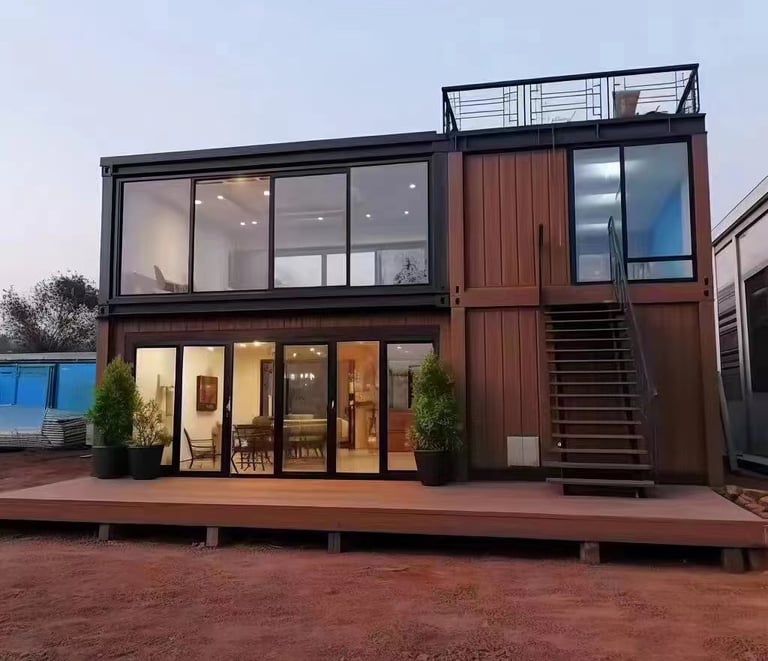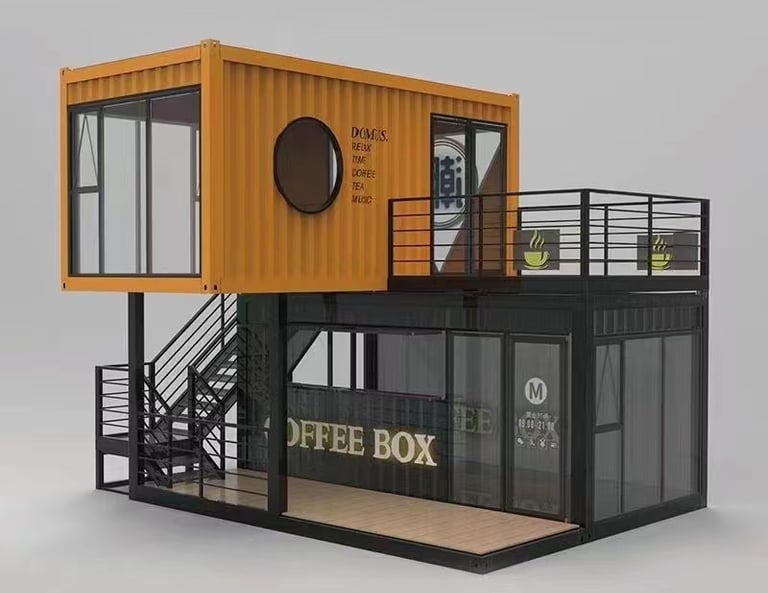Revolutionizing Living Spaces: The Rise of Shipping Container Homes
OUTDOORS
5/21/20225 min read


In recent years, the concept of using shipping containers as homes has gained significant traction. This innovative approach to housing leverages the robustness, affordability, and modularity of shipping containers to create versatile living spaces. From cozy container cabins to sprawling modular container homes, this trend is reshaping various industries, including tourism, education, disaster relief, construction, and hospitality. This blog explores the multifaceted world of shipping container homes, their applications, benefits, and potential challenges.
The Basics of Shipping Container Homes
What Are Shipping Container Homes?
Shipping container homes are residential structures made from recycled shipping containers. These containers, originally designed to transport goods across the globe, are repurposed to create habitable living spaces. They come in various sizes, with the most common being 20-foot and 40-foot containers. These units can be used individually or combined to create larger, more complex structures.
Types of Shipping Container Homes
Container Cabin: A small, standalone unit often used for vacation homes or remote living.
Container House: A larger structure, possibly combining multiple containers, designed for full-time living.
Container Living: A concept that includes both individual and community living arrangements using multiple container homes.
Modular Container Home: Prefabricated units that can be easily assembled and disassembled for relocation or expansion.
Prefab Shipping Container Home: Pre-manufactured homes that are delivered to the site and set up with minimal on-site construction.
Portable Container Home: Homes designed to be easily transported and relocated.
Applications Across Various Industries
Tourism Industry
The tourism industry has embraced shipping container homes as a unique and sustainable accommodation option.
Container Hotel
Container hotels offer a novel lodging experience, attracting tourists seeking something different from traditional hotels. These hotels can be set up in diverse locations, from urban centers to remote natural settings, providing flexible and eco-friendly lodging solutions.
Adventure Camp
Adventure camps utilizing container homes offer durable and weather-resistant accommodations for outdoor enthusiasts. These camps can be quickly set up in rugged terrains, providing comfortable living spaces for campers and hikers.
Eco-friendly Lodge
Eco-friendly lodges made from shipping containers appeal to environmentally conscious travelers. These lodges often incorporate sustainable practices, such as solar power and rainwater harvesting, to minimize their ecological footprint.
Glamping Site
Glamping, or glamorous camping, combines the luxury of modern amenities with the adventure of camping. Container homes fit perfectly into this niche, providing stylish and comfortable accommodations in scenic locations.
Beach Resort
Beach resorts using container homes offer a blend of modern design and natural beauty. The modular nature of containers allows for creative layouts that maximize ocean views and beachfront access.
Education Industry
Shipping container homes are also making an impact in the education sector, providing flexible and cost-effective solutions for various educational needs.
School Office
Container units can be repurposed into functional and efficient school offices. They provide a quick and affordable solution for expanding administrative space without extensive construction.
Mobile Library
A mobile library made from a shipping container can bring books and educational resources to underserved areas. These libraries are easy to transport and set up, making them ideal for remote or rural communities.
Temporary Classroom
Temporary classrooms built from shipping containers offer a practical solution for schools facing overcrowding or undergoing renovations. These classrooms can be quickly installed and equipped with necessary educational facilities.
Educational Workshop
Containers can be converted into specialized educational workshops for subjects like art, science, or technology. These workshops provide dedicated spaces for hands-on learning and creativity.
Training Center
Training centers using shipping containers are a cost-effective way to provide vocational and skills training. They can be easily adapted to different training programs and moved to various locations as needed.
Disaster Relief Industry
In disaster-stricken areas, shipping container homes provide immediate and reliable shelter solutions.
Emergency Shelter
Containers can be rapidly deployed to provide emergency shelter for displaced populations. Their durability ensures they can withstand harsh conditions, offering safe and secure housing.
Temporary Housing
Temporary housing solutions made from shipping containers can accommodate individuals and families while permanent reconstruction efforts are underway. These homes provide a sense of stability and privacy during challenging times.
Construction Industry
The construction industry benefits from the versatility and efficiency of shipping container structures.
Construction Site Office
Shipping containers make ideal construction site offices, offering portable and durable spaces for project management. They can be easily relocated as the project progresses, providing a consistent workspace.
Mobile Office
Mobile offices created from containers can be used in various industries, not just construction. They offer a flexible office solution that can be transported to different job sites or locations.
Hospitality Industry
In the hospitality sector, container homes are used to create innovative and sustainable lodging options.
Modular Hotel
Modular hotels constructed from shipping containers offer a scalable and cost-effective solution for hospitality providers. These hotels can be expanded or reduced based on demand, providing flexibility in operations.
Benefits of Shipping Container Homes
Sustainability
Shipping container homes promote sustainability by recycling used containers and reducing the demand for traditional building materials. This reuse helps decrease the carbon footprint associated with new construction.
Affordability
The cost of constructing a shipping container home is generally lower than traditional housing. The availability of used containers and the reduced need for extensive building materials and labor contribute to significant cost savings.
Durability
Shipping containers are designed to withstand harsh conditions at sea, making them extremely durable and weather-resistant. This durability translates to a longer lifespan for container homes, reducing maintenance and replacement costs.
Versatility
The modular nature of shipping containers allows for endless design possibilities. Containers can be stacked, combined, and modified to create unique and functional living spaces tailored to specific needs.
Speed of Construction
Building a container home is faster than traditional construction methods. Prefabricated units can be delivered and assembled on-site in a matter of days or weeks, significantly reducing the time to occupancy.
Portability
Shipping container homes can be easily transported, making them ideal for temporary or mobile applications. This portability is especially beneficial for industries that require frequent relocation or temporary setups.
Challenges and Considerations
Insulation and Temperature Control
One of the primary challenges of shipping container homes is insulation and temperature control. Containers are made of steel, which can become extremely hot or cold depending on the weather. Proper insulation and climate control systems are essential to ensure comfortable living conditions.
Structural Modifications
While containers are structurally robust, modifications such as cutting windows, doors, and additional spaces can compromise their integrity. It's crucial to work with experienced professionals who understand the structural implications of these modifications.
Zoning and Building Codes
Shipping container homes must comply with local zoning and building codes, which can vary widely. It's essential to research and understand these regulations before embarking on a container home project to avoid legal and compliance issues.
Resale Value
The resale value of shipping container homes can be unpredictable. While some buyers may appreciate the uniqueness and sustainability of these homes, others may prefer traditional housing. Market research and understanding potential buyer preferences are important for future resale considerations.
Conclusion
Shipping container homes represent a revolutionary approach to modern living, offering sustainable, affordable, and versatile housing solutions. Their applications across various industries—from tourism and education to disaster relief and construction—demonstrate their wide-ranging potential. Despite some challenges, the benefits of container homes make them an attractive option for those seeking innovative and efficient living spaces.
As the world continues to prioritize sustainability and adaptability, shipping container homes are poised to play a significant role in the future of housing and commercial spaces. Whether for permanent residences, temporary accommodations, or mobile offices, these robust and modular units offer a glimpse into a more flexible and eco-friendly way of living.


